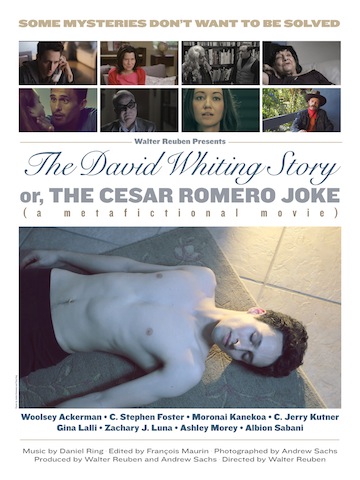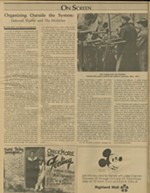Telling The David Whiting Story or, the Cesar Romero Joke
Louis Black reflects on working decades ago with Walter Reuben
By Louis Black, 8:45AM, Mon. Feb. 16, 2015
The David Whiting Story or, the Cesar Romero Joke, being shown on Tuesday by the Austin Film Society, is by filmmaker Walter Reuben, who came quite late to the moviemaking game. Once a rare collectibles dealer in Austin, Reuben moved to Los Angeles decades ago.
Having made some short films in the Eighties, Reuben hadn't directed during those intervening decades when he decided to return to filmmaking. Kicking off with a feature, this experimental work has had less than a handful of screenings in L.A., which made it not even a dark horse but a nonentry in the race when it won the prestigious Douglas Edwards Independent/Experimental Film/Video Award from the Los Angeles Film Critics Association this past December.
In the early 1980s, living in Austin, Reuben had evolved from being a high-end dealer in collectible maps to one selling rare movie posters. As with any dealer routinely buying and selling, the most extraordinary collection of movie posters passed through his houses. At one time he had a house in Clarksville where, if you looked over at as you drove by, you could see the stunning poster for Louis Feuillade's Les Vampires when the curtains were open (recently featured by Lars Nilsen on the AFS Viewfinders site). Earlier, in another house he had a giant French Roscoe "Fatty" Arbuckle poster mounted in the living room (Arbuckle's being among the rarest of all movie paper).
Walter hired Ed Lowry and me in the very early Eighties to write descriptions for his Posters for Sale catalogs. Reuben sold not just hundreds of posters but specialized collections, such as movie paper on all-black films, as well as a number of major offerings of collections of great scripts (I remember being knocked out by an early shooting script for Stagecoach, which included a diagram of who sat where inside the coach).
Fascinated by cutting-edge cinema, Reuben combined that with a genuine affection for mundane but ornately presented work. (I still have a couple of 16mm prints of Liberace TV shows that once belonged to Walter.) The range of his film interests was extensive and his knowledge real and deep (although when Ed Lowry was in the room we were all initiates).
Bizarre narrative strategies as well as faux linear story feints intrigued him, not to mention durational cinema (both when narratively ambitious and purposefully and difficultly dull) and repetitive humor. Intentionally offensive work also delighted him as an intellectual exercise about figure skating on the thin ice of what constitutes decency. In his own work this has translated into the obnoxious pushed and then charmingly pushed again.
Walter began to make movies, okay videos shot at home with friends as actors. He would write a short scene, and have folks come in and perform it. Then have others, not seeing the script, look at the scene and try to replicate it, with yet another group of actors following them. Not just a twisted cinematic telephone routine but something about how the nature and texture of movies make meaning. Certainly not for everyone, though definitely for some.
Ed Lowry loved Walter's work. I liked them, some a lot. Ed encouraged Walter. Lots of things happened, one of which was that Reuben moved to L.A. and established himself as a high-end film poster dealer there.

Two decades passed, maybe closer to three. While cleaning house, Walter came across his old work, had it transferred, and re-watched it. A year or two back, he came to Austin. We had dinner. He talked in long, loping narratives that frequently came back on themselves. More and more, he was talking about making movies again. He had produced and written a short film in the interim, but he was getting ready to direct.
Then he wrote that he was making a film. Next thing I knew, he sent me a DVD. To be honest, I have a stack of DVDs from filmmakers who I'm very slowly working my way through, though new ones show up at a much quicker rate than older ones get watched. The David Whiting Story, or The Cesar Romero Joke is ambitious and assured. It's as though Walter Reuben had been honing his craft over the last two decades rather than taking a hiatus from moviemaking. Watching his earlier films, it is so obvious from where this one comes. Whether you like it or not, it strikes one as the work of a mature filmmaker at the top of their form, not a re-engaged cineaste. The production values are striking.
There is a terrible assault and equally horrific celebration of textuality and narrative, reminiscent of Jacques Rivette. Reuben wants to bore you and engage you so irritatingly that you are forced to think about how narratives work and how movies make meaning. Not that this film is stylistically similar to Rivette, but it shares the same level of sophistication, playfulness, and accomplishment.
As you watch the movie (and readers should already know whether this is their cup of tea or not), you may feel the call to arms whenever Gina Lalli (Slacker) appears in her increasingly insane performance as a dead yet talking Ayn Rand. This is powerful moviemaking!
Of course, during the film I kept thinking of Ed Lowry, who not only would have absolutely loved the movie but would have actually swooned in delight at the audacious conceit of modeling a feature work about a now obscure tragedy on the set of The Man Who Loved Cat Dancing. A resonant, emotionally painful, comic-absurdist take on textuality and the complexities of narrative, The David Whiting Story embraces bizarre Hollywood, but somehow seems still startlingly autobiographical. It will be interesting to see what film Reuben makes next. A disclosure, he's already asked me to be in it, talking about film he shot over 20 years back. I'm figuring my disruption of the text will be to not watch that film but still talk about it.
The David Whiting Story or, the Cesar Romero Joke screens Tuesday, Feb. 17, 8pm, at the AFS Screening Room at Austin Studios. Click for ticket info.

A note to readers: Bold and uncensored, The Austin Chronicle has been Austin’s independent news source for over 40 years, expressing the community’s political and environmental concerns and supporting its active cultural scene. Now more than ever, we need your support to continue supplying Austin with independent, free press. If real news is important to you, please consider making a donation of $5, $10 or whatever you can afford, to help keep our journalism on stands.
May 3, 2022
The David Whiting Story or, the Cesar Romero Joke, Walter Reuben, Ed Lowry, Gina Lalli, Douglas Edwards Independent/Experimental Film/Video Award









